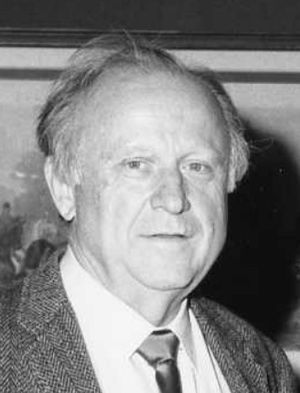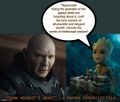Frank Herbert (nonfiction): Difference between revisions
No edit summary |
No edit summary |
||
| (10 intermediate revisions by the same user not shown) | |||
| Line 4: | Line 4: | ||
The ''Dune'' saga, set in the distant future and taking place over millennia, deals with complex themes such as human survival and evolution, ecology, and the intersection of religion, politics and power. Dune itself is the best-selling science fiction novel of all time and the series is widely considered to be among the classics of the genre. | The ''Dune'' saga, set in the distant future and taking place over millennia, deals with complex themes such as human survival and evolution, ecology, and the intersection of religion, politics and power. Dune itself is the best-selling science fiction novel of all time and the series is widely considered to be among the classics of the genre. | ||
== Opinions == | |||
[[Karl Jones (nonfiction)|Karl Jones]] writes (October 2019): | |||
<blockquote> | |||
I read ''Dune'' and various other Herbert novels starting at about age fifteen (1976); by my late twenties I had moved on to other authors. | |||
Four or five years ago I re-read ''Dune'' and found that it's not as good as I remembered. | |||
Then I re-read ''The Dosadi Experiment'' and said "Holy crap, this is some bad, garbled prose." And by bad, I mean bad. The *ideas* are powerful, but the prose feels like a ragged afterthought. | |||
Consider also (but don't bother reading) ''The Heaven Makers'', where excessively purple dialog is interspersed with italicized inner thoughts along the lines of "The fool, he will never see the trap that I have so cleverly laid — !" and "I must be careful that he thinks me a fool who will fall into his trap — !", etc. ad nauseum. | |||
Other Herbert clunkers include ''The White Plague'' ... a handful of interesting ideas blown up into a vast, turgid exercise in letting the old man ramble on his hobbyhorse. | |||
On the other hand, ''The Santaroga Barrier'' is excellent, and ''Hellstrom's Hive'' has also aged well in my opinion. | |||
</blockquote> | |||
-- [https://www.facebook.com/malcolm.lawrence/posts/10157196269586154?comment_id=10157200838501154 Facebook post] | |||
== In the News == | == In the News == | ||
<gallery | <gallery> | ||
File:Frank Herbert's Groot.jpg|link=Frank Herbert's Groot|'''''[[Frank Herbert's Groot]]''''' is a children's adventure book by Frank Herbert which combines elements of his ''June'' (credited to Frank Herbert 1.1 "as told to OrbGazer") and the character Groot from ''Guardians of the Galaxy''. | |||
File:The Dosadi Experiment front cover first edition.jpg|''The Dosadi Experiment'' proud to be Frank Herbert's work. | File:The Dosadi Experiment front cover first edition.jpg|''The Dosadi Experiment'' proud to be Frank Herbert's work. | ||
</gallery> | </gallery> | ||
== Fiction cross-reference == | == Fiction cross-reference == | ||
* ''[[Frank Herbert's Groot]]'' | |||
* [[Gnomon algorithm]] | |||
* [[Gnomon Chronicles]] | |||
* [[Red Egg]] | * [[Red Egg]] | ||
== Nonfiction cross-reference == | == Nonfiction cross-reference == | ||
* [[ | * [[The Dosadi Experiment (nonfiction)]] | ||
* [[Litany against decaffeination (nonfiction)]] - parody of Herbert's ''litany against fear'' | |||
External links | == External links == | ||
* [https://en.wikipedia.org/wiki/Frank_Herbert Frank Herbert] @ Wikipedia | * [https://en.wikipedia.org/wiki/Frank_Herbert Frank Herbert] @ Wikipedia | ||
[[Category:Nonfiction (nonfiction)]] | [[Category:Nonfiction (nonfiction)]] | ||
{{Template:Categories: Frank Herbert}} | |||
Latest revision as of 19:29, 25 May 2024
Frank Patrick Herbert, Jr. (October 8, 1920 – February 11, 1986) was an American science fiction writer best known for the novel Dune and its five sequels.
Though he became famous for science fiction, he was also a newspaper journalist, photographer, short story writer, book reviewer, ecological consultant and lecturer.
The Dune saga, set in the distant future and taking place over millennia, deals with complex themes such as human survival and evolution, ecology, and the intersection of religion, politics and power. Dune itself is the best-selling science fiction novel of all time and the series is widely considered to be among the classics of the genre.
Opinions
Karl Jones writes (October 2019):
I read Dune and various other Herbert novels starting at about age fifteen (1976); by my late twenties I had moved on to other authors. Four or five years ago I re-read Dune and found that it's not as good as I remembered.
Then I re-read The Dosadi Experiment and said "Holy crap, this is some bad, garbled prose." And by bad, I mean bad. The *ideas* are powerful, but the prose feels like a ragged afterthought.
Consider also (but don't bother reading) The Heaven Makers, where excessively purple dialog is interspersed with italicized inner thoughts along the lines of "The fool, he will never see the trap that I have so cleverly laid — !" and "I must be careful that he thinks me a fool who will fall into his trap — !", etc. ad nauseum.
Other Herbert clunkers include The White Plague ... a handful of interesting ideas blown up into a vast, turgid exercise in letting the old man ramble on his hobbyhorse.
On the other hand, The Santaroga Barrier is excellent, and Hellstrom's Hive has also aged well in my opinion.
In the News
Frank Herbert's Groot is a children's adventure book by Frank Herbert which combines elements of his June (credited to Frank Herbert 1.1 "as told to OrbGazer") and the character Groot from Guardians of the Galaxy.
Fiction cross-reference
Nonfiction cross-reference
- The Dosadi Experiment (nonfiction)
- Litany against decaffeination (nonfiction) - parody of Herbert's litany against fear
External links
- Frank Herbert @ Wikipedia


